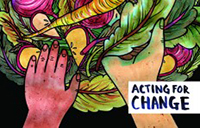A new report on climate change co-authored by the Faculty of Education and the Faculty of Environmental Studies at York University positions education as playing a fundamental role in shaping responses to climate change.
 “Acting for Change” provides a small-scale local response to an international agenda and crisis by focusing on “schooling” to highlight the work of teachers in the GTA who are widely recognized as climate change leaders, and makes nine recommendations for future policy and practices.
“Acting for Change” provides a small-scale local response to an international agenda and crisis by focusing on “schooling” to highlight the work of teachers in the GTA who are widely recognized as climate change leaders, and makes nine recommendations for future policy and practices.
Some of these recommendations include: placing climate change education as a central curriculum theme and identifying climate change leaders; focusing on political ecology; and exploring the underpinning social and environmental conditions affecting climate change. The final recommendation is for the development of a climate change education curriculum that is playful, exciting, inspiring and that invites students to encounter a world that is dynamic and alive – being more about passion, hope and love than drabness, apathy and despair.
“The report is significant in a number of different ways,” said Faculty of Education Professor Steve Alsop, one of the co-authors of the report. “Few would disagree that education (whether in schools, universities or other cultural and ecological sites) has a fundamental role in shaping our responses to climate change. Yet, education seems somewhat overlooked in climate change discussions whether at the local or international level.
“Even in the latest round of negotiations in Paris this past December,” he said, “education was not a central consideration as a factor for climate change.”
York University is known to be a leader in climate change with both faculty researchers and doctoral students at the institution focusing on climate change education in schools, universities and other cultural institutions, including the media, science centres and museums.
The Faculties of Education and Environmental Studies currently offer a joint graduate diploma in environmental education and education for sustainable development. This is the only diploma of its type in Canada. In some ways, the report signifies a concentration of expertise at York U, which is becoming more widely recognized.
“Our hope is that the report will form a conversation piece in local school boards and universities, encouraging them to pay greater attention to climate change education in the curriculum,” said Alsop.
The report was widely circulated to teachers, teacher educators, and also to local and national environmental organizations.
“Many of these organizations have education as a central mandate, and our hope is that the report will encourage schools, school boards and environmental organizations to work closely together,” he said. “It is not offered as definitive, but as a possible starting point for a conversation. It has an aesthetic and narrative style that we hope is provocative, but not overly ‘directive’ or ‘official.’”
To view a PDF version of the report, visit edu.yorku.ca/files/2015/12/CCE-ActingForChange.pdf.


